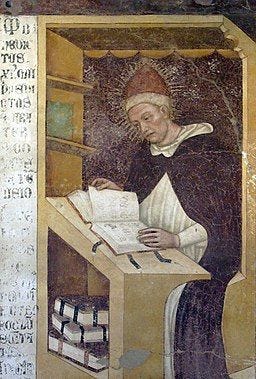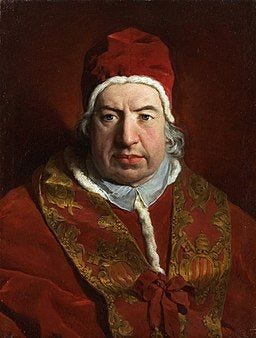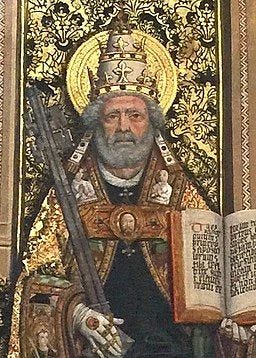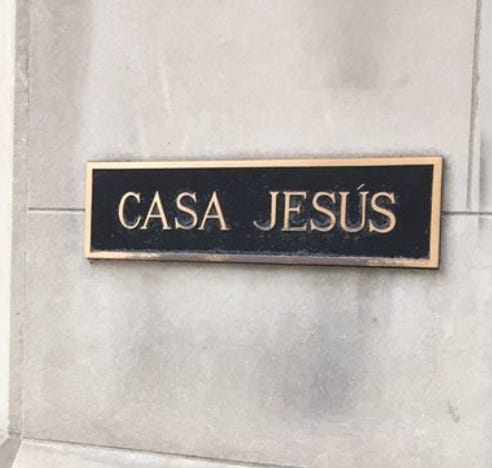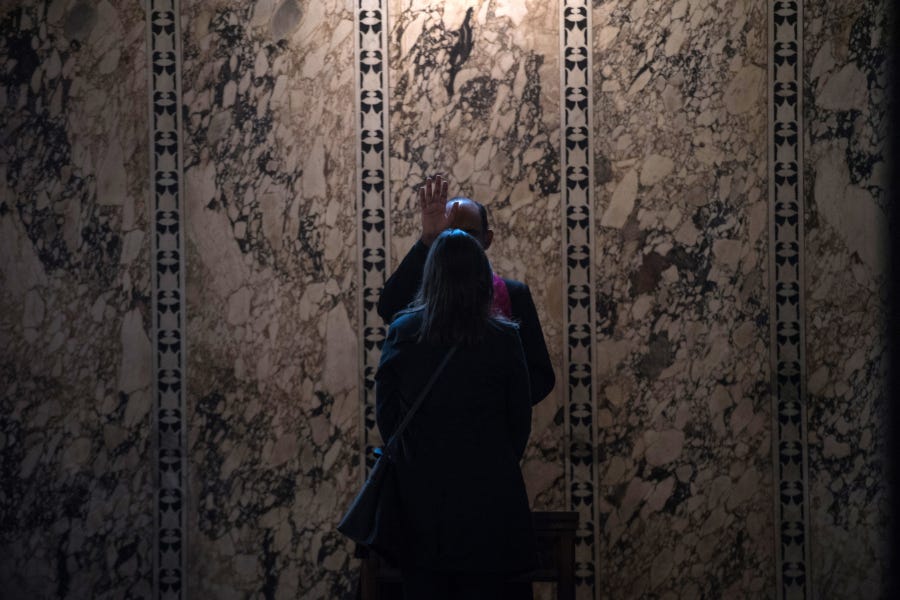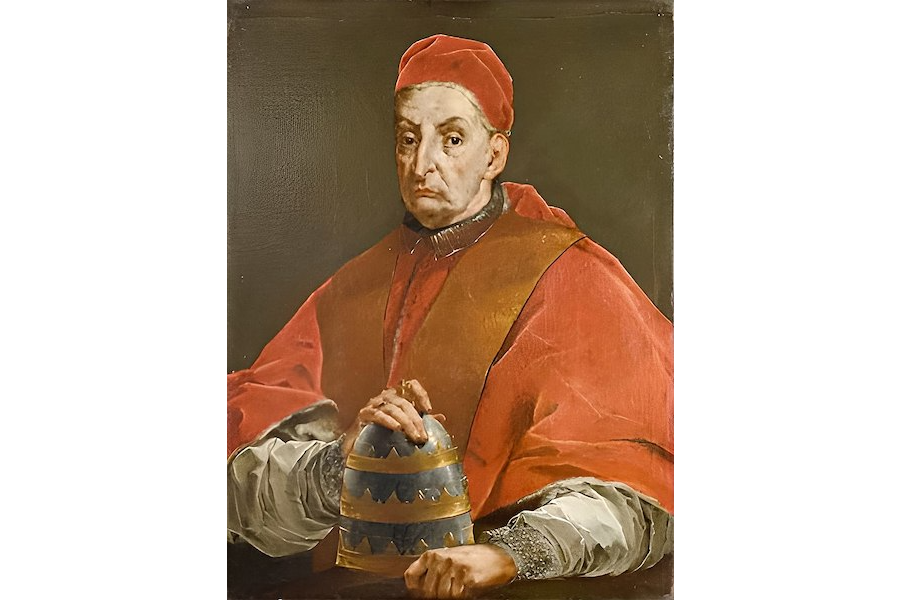
When Cardinal Joseph Ratzinger was elected pope in 2005, he took the name “Benedict.” It was the 16th time a pope had taken this name.
Well, kind of.
See, about 1,000 years earlier, there was Pope Benedict X, who was actually an antipope, although by the time he was determined to be an antipope, he was already established in the numbering of Benedicts. So he got to stay.
There were a few other Antipopes Benedict too, although they were never included among the official number of popes with that name.
And Pope Benedict IX in the 11th century was elected pope on two separate occasions - the only pope to hold that distinction.
It turns out that there are a lot of interesting stories surrounding the men who have gone by the name Pope Benedict. So we did a little research, and we present to you: A Brief History of Other Popes named Benedict:
The Top 5
1. Pope Benedict IX (1032-1044, 1045–1046)
Pope Benedict IX was first elected pope in 1032 at the age of 20. In 1044, he was deposed and replaced by Sylvester III.
But in 1045, Benedict had Sylvester expelled and was himself reelected pope. No sooner was he elected, however, then Benedict sold the papacy to Gregory VI and resigned – for the second time.
Soon after Gregory attempted a reform agenda in Rome, but Benedict decided he'd actually liked being pope, so he began to claim the See of Peter for himself.
Still, in 1046, Benedict was deposed by the Synod of Sutri, Gregory resigned, and Clement XII became pope. But Benedict wasn’t finished. When Clement died the next year, Benedict seized the Lateran Palace and reasserted his claim to the papacy. He was driven out by soldiers the next year, and was excommunicated on simony charges in 1049.
2. Antipope Benedict X (1058-1059)
Benedict X was not a real pope. His family arranged for him to be enthroned as pope amid the coup that followed the death of Pope Stephen IX. Several cardinals immediately denounced Benedict’s papacy as invalid, or at least illicitly gained, and elected Nicholas II as pope. Nicholas then proclaimed Benedict X to be deposed and excommunicated, despite Benedict’s protests that he had been forced into the role of pope against his will.
While all of that was chaotic, it did lead to serious reforms in the way popes were elected – and catalyzed the practice of restricting papal elections only to the members of the College of Cardinals.
But because of the confusion, Benedict X was considered a legitimate pope throughout the 13th century - his election was largely considered to have been illicit until clarification during the reign of Pope Honorius III. He was still believed to be a real pope at the time that the next Pope Benedict took the name Benedict XI. As a result, the antipope is included in the numbering of Popes Benedict.
3. Pope Benedict V (964-965)
Benedict V was elected by the Romans following the death of Pope John XII. However, the emperor, Otto, opposed Benedict - Otto had previously deposed John XII and replaced him with his own nominee, Leo VIII, who had already been rejected by the Roman people.
Otto set up a blockade around Rome, which created a famine that ultimately led to the Roman people handing Benedict over to the emperor’s army, just a month after his election as pope. A synod convoked by Leo then revoked his episcopal consecration and reduced him to the rank of deacon. He was taken by Otto into exile, where he died.
Although he was sometimes considered an antipope throughout history, the general consensus in modern times is that Benedict V’s election as pope was valid.
4. Pope Benedict VI (972-974)
Little is known about Benedict VI’s papacy, except that he was captured and imprisoned in 974 by a group of nobles wishing to replace him with one of their own members, who became Antipope Boniface VII. After a few months in prison, Benedict was strangled to death by order of Boniface, who feared that the real pope might be released.
5. Pope Benedict XV (1914-1922)
Elected pope barely a month into World War I, Benedict XV focused much of his papacy on the war and its aftermath. The pope declared neutrality in the war and led unsuccessful efforts at mediation. He also coordinated humanitarian efforts, particularly the provision of food to children in countries most affected by the war. He negotiated several deals to exchange prisoners of war or citizens in occupied territories. Following the war, he worked to repair relations with France and Italy.
Benedict XV also promulgated the first comprehensive Code of Canon Law, which allowed for clarity and justice in governance throughout the Church. (Honestly, this Benedict would not not have made my list of Top 5 Popes Benedict, but JD and Ed made it quite clear to me that promulgating the code is very, very interesting.)
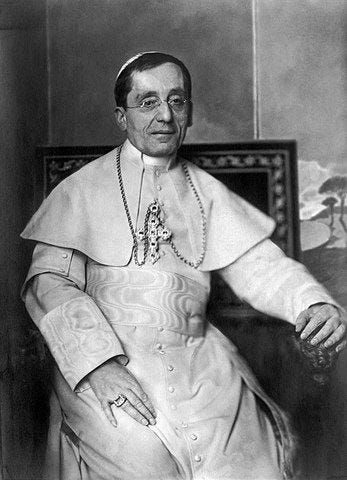
The Other Guys
Pope Benedict I (575-579)
Almost nothing is known about the first Pope Benedict. His papacy took place during a time of famine, plague, and floods in Rome.
Pope St. Benedict II (684-685)
Devoted to the study of Scripture and known for his excellent singing voice, Benedict II was the first Pope Benedict - and is thus far the only one - to be declared a saint. He worked to restore Roman churches and suppress the heresy of Monothelitism, which held that Jesus had only one will.
Benedict II is also largely responsible for ending the lengthy gap between papacies by obtaining a decree from the emperor simplifying previous regulations requiring the Roman emperor to consent to the choice of a new pope. He also symbolically adopted Constantine IV’s two sons.
Pope Benedict III (855-858)
Benedict III underwent a tumultuous path to the papacy. The legates responsible for informing the emperor of Benedict’s election and obtaining his consent instead convinced the emperor to choose an excommunicated archivist as pope instead. Benedict was subsequently imprisoned; however, the people’s unwavering loyalty to him eventually resulted in him being freed and recognized as the rightful pope.
Pope Benedict IV (900-903)
Very little is known about this Pope Benedict. His papacy occurred during a time of conflict in Rome. The few historical documents that mention Benedict IV suggest that he was known for his generosity.
Pope Benedict VII (974-983)
Benedict VII was elected to replace Benedict VI, who had been strangled in prison by order of Antipope Boniface VII. The newly elected pope promptly excommunicated Boniface, who fled with his supporters. Benedict VII dedicated much of his papacy to opposing the practice of simony, which had become prevalent in the Church.
Pope Benedict VIII (1012-1024)
Benedict VIII was a layman before he was elected pope. He was the fourth member of his family to become pope. Known as a strong leader, Benedict led numerous military expeditions and expelled Antipope Gregory VI. He also called for a synod to counter simony and incontinence among the clergy.
Blessed Pope Benedict XI (1303-1304)
The most notable event in Benedict XI’s 8-month papacy is the repair of relations with France, lifting the excommunication of King Philip IV, who had attempted to control and tax the French clergy.
Benedict XI died suddenly, prompting suspicions of poisoning. Known for his holiness, he was beatified in 1773.
Pope Benedict XII (1334-1342)
Benedict XII was the third Avignon pope. Initially hoping to return the papacy to Rome, he eventually accepted the idea as impractical and built the papal palace in Avignon. He worked to reform religious orders in the Church, and issued a papal bull affirming that souls after death could experience the beatific vision before the Last Judgment, ending a theological debate from the previous papacy.
Pope Benedict XIII (1724-1730)
Benedict XIII was a Dominican friar who was elected in a lengthy conclave. As pope, he was known for his simplicity of life and his push against decadence among the clergy. Devoted to prayer and asceticism, he left much of his administrative responsibilities to Secretary of State Niccolò Coscia, a corrupt cardinal who engaged in serious financial abuses, apparently without the pope’s awareness.
His sainthood cause has been opened and closed several times, with concerns about his corrupt Secretary of State causing it to stall in the 1940s. He is currently recognized as a Servant of God.
Pope Benedict XIV (1740-1758)
A noted scholar, Pope Benedict XIV advocated for art, scientific study, and philosophy during his papacy. Many of his writings involved relations with Jews and Protestants, such as how mixed marriages between Catholics and Protestants should be handled. He attempted - with limited success - to revive the struggling economy of the Papal States by reducing the size of the army and encouraging free trade and agriculture. Benedict XIV was also known for his love of gambling and use of profanity - the latter was a habit that he apparently tried in vain to quash throughout his papacy.
Other Antipope Benedicts
Antipope Benedict X, sometimes known as Pope Benedict X, is the most prominent antipope named Benedict (He made our Top 5. See his story above). But there were a few others as well:
Antipope Benedict XIII (1394–1423)
Antipope Benedict XIII was an antipope during the Western Schism, which occurred when a group of cardinals rejected the election of Pope Urban VI following the conclusion of the Avignon papacies. Benedict XIII was eventually deserted by most of the cardinals who had initially supported him and lost the recognition of France, which he had initially enjoyed. The antipope insisted until his death that he was the rightful pope, and he created four new cardinals on his deathbed, in order to carry on his line of succession.
Antipopes Benedict XIV (1424–1429), (1430–1437)
There were not one but two different Antipope Benedict XIVs in the 1400s. Both were elected by a single elector, Jean Carrier, who was himself designated as a cardinal by Antipope Benedict XIII. Carrier rejected the election carried out to determine Antipope Benedict XIII’s successor, instead deciding on a different successor, who took the name Benedict XIV. When that antipope died, Carrier single handedly elected himself pope, also taking the name Benedict XIV. He spent the entirety of his false papacy imprisoned by yet another antipope, Clement VIII.


